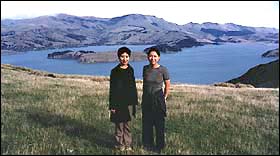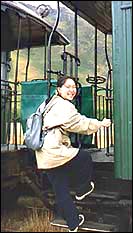– Dorothy – 10/1/97
“Changing countries has its problems – for the exchange student and the host family.”
Emiko Komagata was sent by her mother to English school in Japan – rather a difficult change for her as she knew almost no English. She responded so well to this change that next she wanted to go to where most people spoke English all the time. This she did when she was fifteen. She went to Los Angeles for a month. She returned for tertiary study and now visits her homestay family every year. Here in Christchurch, New Zealand, she is in her fourth homestay in a household where she is their thirteenth homestay student.

|
| Emiko and Ayano, exchange students from Japan, on the Port Hills near Christchurch |
Emiko’s home town is what she calls “a small town in Japan” – Kawasaki – with a population of 1,203,000 people and an area of 142 square kilometres. Most people live in apartments and the streets are narrow compared with the roads in Los Angeles. So her first strong impression on arrival was that everything looked different, including the height of American people who were much taller than the average Japanese people, and the variety in the colour of people’s hair. Only a few had black hair!
Getting into bed was the first problem at her homestay. At what level among the layers should she sleep? She watched how her American homestay sister got into bed, because in Japan she was used to sleeping between two futons and found American bedding confusing. The problem of how to make the bed was solved in the same way – by watching.
Asking questions seemed too scary for some of her Japanese friends and they slept on top of the bedding on a couch for weeks because they did not know how to turn it into a bed. Emiko found out about arrangements for laundry by asking. Her hostess showed her how to turn on the shower, so she coped well.
Eating with a knife and fork was a problem. Would the meat slip off the plate when she tried to cut it? Which cutlery should she use? Again she solved the problem by watching everyone else first. Food was not a problem as she had eaten Western food in Japan and enjoyed it.
Calling older people like her homestay parents by their first names was a change she did not find easy – so different from the Japanese way.
The large amount of homework was a surprise to Emiko when she attended an American high school. Little is set in Japanese schools and the teachers do not check to see whether the students have done it. Many students attend cram schools outside regular school hours and rely on these to get them through their exams.
Small classes, lecturers taking a personal interest in the students’ progress, offers of individual assistance, group discussions, tests and exams – all these happening in tertiary education were a suprise to Emiko. Her Japanese university awarded her a scholarship to study at the Business Studies Programme at Christchurch College of Education.
At the university which Emiko attended there are hardly any tests or exams. The assessment is based on a report which the students must research and write independently. There is little emphasis placed on regular attendance at lectures which often relate very little to the report topics. Writing in English in the style appropriate to business reports has been a challenge for Emiko. The short time allowed in exams and tests was an additional pressure.
Emiko has coped with the changes for one semester and the result? She passed all her subjects with flying colours.
 |
| Emiko boarding the Kingston Flyer |
Like most exchange students Emiko took the chance to visit other places in New Zealand. Queenstown attracts most overseas visitors. While she was there Emiko went for a trip on the vintage train, the Kingston Flyer, and greatly enjoyed it.
Since she returned to Japan Emiko has completed her university degree course. Recently she has had to take over the management of one of her family’s businesses, a restaurant, at very short notice. She has found that her studies in Business Communication and Organisation and Management while at the College of Education have been most helpful in her new role.
For further information follow these links: Education in Canterbury – http://www.canterbury.net.nz/community/ Accomodation in Canterbury – http://www.canterbury.net.nz/tourism/ Homestay – http://www.synapse.net.nz/pages/homestay/ – http://www.minifie.co.nz/homestay/
People Making Changes Main Page




